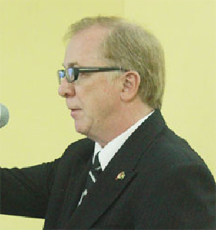“Corrupt practices constitute a vicious force that undermines fair competition, suppresses economic growth and ultimately destabilises an entrepreneur’s own existence,” Canada’s High Commissioner to Guyana David Devine declared in his feature address to mark the 10th anniversary of EMPRETEC last week.
In a presentation that appeared focused on corruption, a theme with which he has already attracted considerable public attention recently, Devine told his audience of mostly local small and micro-business owners that “bribery is illegal and there is no guarantee that favours bought will materialise.”
The Canadian diplomat also addressed issues such as the work of EMPRETEC, the role of the entrepreneurship in economic growth and youth entrepreneurship. However, his presentation lent continuity to his speech two weeks ago at a Guyana Investment Seminar attended by President Donald Ramotar and senior public and private sector officials where his pronouncements on corruption provoked considerable media coverage and public comment.

Devine told his audience last Friday evening that despite the prominent role which regional entrepreneurs continued to play in creating economic growth, the business community was still faced with numerous challenges some of which reposed in “archaic laws and lack of proper oversight for regulations and taxation” which perpetuate corruption.
Alluding to the recently concluded investment seminar, Devine said it had highlighted “challenges regarding the judiciary, framework of company law to enforce contracts and property rights as key impediments to investors and possible opportunities for exploitation.”
While the Canadian diplomat’s public statements on the theme of corruption have been generalised, avoiding direct reference to Guyana, they coincide with sustained public criticism of the political administration for what its critics say has been a studied indifference to a worsening condition of corruption involving both public and private sector officials.
In his presentation at the EMPRETEC event, Devine said corruption inhibits the advantageous allocation of resources, since some of those resources must be diverted to corrupt officials. “Corruption, therefore, has a negative contribution of profitability, and, in turn, negatively impacts total investment and entrepreneurship,” Devine said.
Meanwhile, the Canadian envoy said Guyana needed to ensure that the seven years of uninterrupted growth which it had recorded up to 2012 was “maintained and even surpassed”, if it seeks to position itself as one of the region’s leading economies. Guyana, he said, was in an ideal position to facilitate an environment in which entrepreneurship and innovation can thrive.








